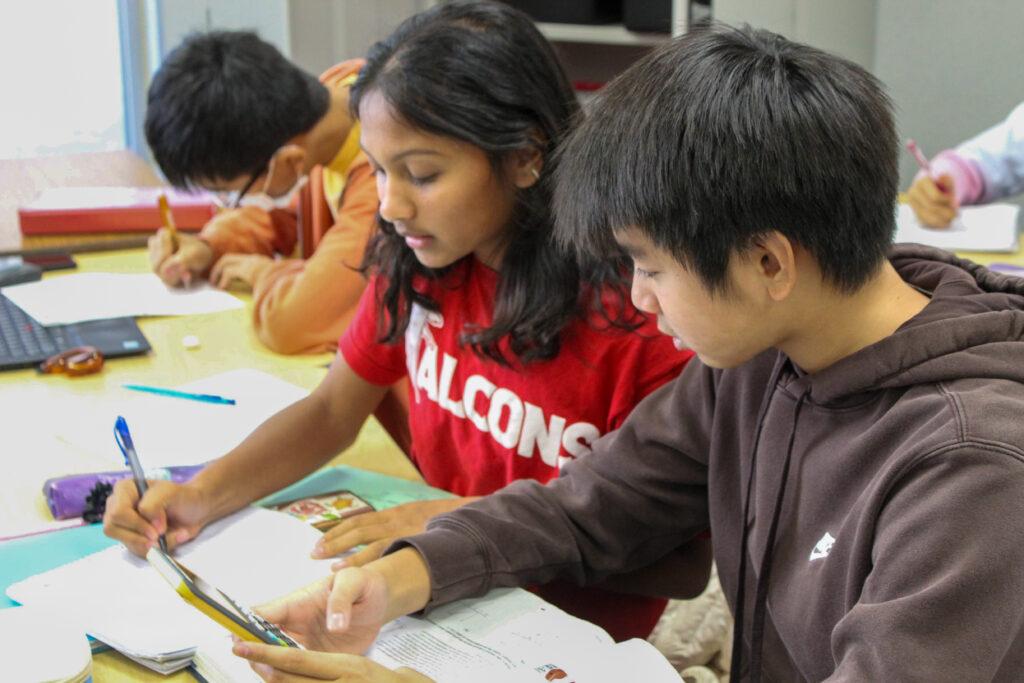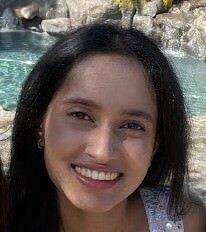As the bell rings at the start of tutorial, Algebra 2 Honors and AP Calculus AB teacher Lisa Ginestet-Araki watches as her classroom, located in the corner of the math wing, fills with students eager to ask questions and study for upcoming tests. Among them are several pairs of mentors and mentees, devoted to teaching each other math skills and building friendships along the way.
The math mentor program is a volunteer-based program where students can sign up to tutor other students and receive volunteer hours in return. Mentors and mentees meet each week during tutorial in Ginestet-Araki’s classroom.
When Ginestet-Araki initiated the program in 2021, she had a simple vision: to fulfill the need for additional math aid within her own classes. To her surprise, in just three years’ time, the program has grown nearly four times in size and now includes 70 mentees and mentors from all grade levels and math courses.
Ginestet-Araki was originally inspired by Multivariable Calculus teacher Ken Prucha, one of her former colleagues at James Logan High. Prucha organized a largely successful student mentoring program that began 15 years ago. However, while Prucha’s system scheduled student mentoring sessions during lunch, Ginestet-Araki takes advantage of tutorials to ensure that mentors and mentees have a convenient time and place to meet at least once a week for 30 minutes.
In the first year, the program ran in her classroom for only students in her Algebra 2 course. Ginestet-Araki had asked some of her mathematically stronger Algebra 2 Honors students if they were willing to help other students in Honors or regular Algebra 2 classes who were struggling to keep up with the content.
“I eventually decided to experiment because many of my students from Algebra 2 [and Algebra 2 Honors] moved on to Precalculus Honors, and they wanted to continue being mentors,” Ginestet-Araki said. “The program started expanding and it eventually became open to all classes.”
At first, mentees outnumbered mentors. That meant Ginestet-Araki sometimes had to pair two students of the same math level — although this worked out, she said it was not ideal. Later, as all of the math department teachers began pitching in and persuading their most outstanding veteran students to apply, Ginestet-Araki had more flexibility to match mentees with mentors who were one or two levels more advanced.
For example, Ginestet-Araki noted that Calculus BC teacher PJ Yim has helped by providing his Calculus BC students as mentors; his students take the hardest variant out of all the rigorous AP calculus courses and have the background to help all lower level students.
On occasion, qualified freshmen can also participate as mentors. Students who took Ginestet-Araki’s Algebra 2 Honors class in 8th grade go on to take Precalculus Honors in freshman year and already have the skillset to mentor their peers at lower levels. However, the majority of mentors are upperclassmen.
“This year, the mentors are mostly juniors and seniors plus a few sophomores,” Ginestet-Araki said. “The ratio of mentors to mentees is always an ebb and flow — sometimes I get an increase in mentees right after a chapter test. We currently have a surplus of mentors, which is really great.”
To join the program, prospective mentors and mentees must fill out a paper form that can be picked up from Ginestet-Araki. She decided last year to switch from a Google Form to a paper application.
Not only are the logistics of the paper form easier, but according to Ginestet-Araki, the extra step of students coming in and chatting face to face allows her to remind them of the once-a-week mentoring expectations.
At the end of each school year, Ginestet-Araki adds up the number of hours that each mentor reports and gives them volunteer credit for what they have contributed. She continues to maintain full trust in her students, as there has not been any indication of students trying to cheat the system for volunteer hours.
“Most of the mentors are my past students, so I feel like there’s that extra level of trust because I know them so well. I like to assume that they’re [having integrity],” Ginestet-Araki said.
The program has only modest funding and Ginestet-Araki volunteers her own time to improve student performance by matching students and facilitating sessions. She said she continues to commit because she knows the system is effective.
Sophomore Julie Dong has participated as a mentee in the program for two years. She thinks that the math mentor program provides more flexibility than private tutoring services outside of school.
“I had a math tutor outside of school last year for a bit, and then I did a little bit of tutoring during the summer. I find that because [my math mentor] is at school, it’s more convenient [to ask questions], and they often reply to my messages too,” Dong said.
The average cost for a private academic tutor in Saratoga is at least $30 an hour, which can be an expensive commitment for some families. However, signing up to be tutored by a mentor in the math mentor program is completely free.
Additionally, since mentors have first-hand experience of taking their mentees’ course, they know exactly what to expect and how to help them prepare. Ginestet-Araki has seen definite upward trends with mentee test scores, sometimes even by a full grade.
Research has shown that peer tutoring contributes to academic success of both students who tutor and students being tutored. Peer work not only builds knowledge in weak concept areas, but also contributes to better social relationships, improves positive school culture, and increases classroom engagement.
“I think that any time you teach math to another student, you get better at it, whether you’re in Precalculus Honors, AP Calculus BC, or Algebra 1,” Ginestet-Araki said. “It’s really beneficial for the mentors and for the mentees because they get to hear a different perspective than how their teacher teaches it.”
Besides improvement in grades, what Ginestet-Araki finds even more rewarding is seeing friendships blossom between students of different grade levels who were initially complete strangers.
“Students come up to me and say, ‘Hey, we worked well together last year. Can we pair up again this year?’ Things like that make the program really cool and definitely memorable,” she said.
Ginestet-Araki hopes that in the future, she can continue to improve the program by finding a way to enforce regular meeting hours for every pairing. She said many students started by meeting once or twice each week, but sessions eventually discontinued.
Her biggest concern is that if the students are not meeting consistently, the program will be ineffective. She hopes to find a digital way to track timesheets so that she can more easily identify who is meeting on a weekly basis and improve mentor performance.
“If I had more time and resources, it would be nice to have more training for the mentors,” Ginestet-Araki said. “Maybe once or twice during lunch or tutorial, just to give them extra resources and a better understanding on how to help other students effectively.”



























